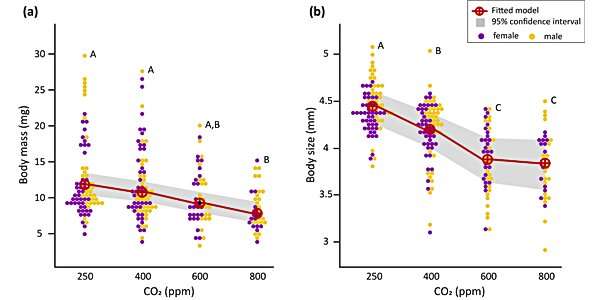Elevated carbon dioxide levels in the atmosphere negatively affects dung beetles size and survival

Climate change is a truth of the 21st century that is difficult to avoid. The burning of fossil fuels in industry, for transport, and other everyday life activities of Homo sapiens has resulted in elevated levels of CO2 in the Earth’s atmosphere. Extreme weather conditions as seen in recent flood, drought and fire events worldwide are some of the most obvious ways in which increasing CO2 levels are changing our world. But there are some serious effects that CO2 is having on our ecosystems that are less easily observed.
A new study led by Wits University post-doctoral researcher, Dr. Claudia Tocco, provides evidence that elevated CO2 levels directly affects the development and survival of tunneling dung beetles (Euoniticellus intermedius). The study, published in the international journal, Global Change Biology, presents a possible explanation for the current ‘insect apocalypse’ – a global decline in insect populations that is still not well understood.
Serendipitous science
“The idea to investigate the effects of elevated CO2 levels on dung beetles was a result of ‘serendipitous science’,” says Tocco. “My labmate and colleague at Wits, Mr. Nic Venter, was growing cacti under different CO2 conditions to investigate how these plants may be affected under future scenarios in our changing world.” Venter was looking at CO2 levels under four scenarios: pre-industrial (~1750), modern-day, 30 years into the future, and 50 years into the future. “We thought, why not put some dung beetles under the same conditions and see what happens?,” says Prof. Marcus Byrne, senior author of the paper and Dr. Tocco’s postdoctoral advisor. What they found came as a surprise.
Beetles grown under heightened levels of atmospheric CO2 experienced lower survival rates, and were smaller in size. “When raised under CO2 levels predicted for the year 2070, a third fewer beetles emerged and were 14% smaller in size when compared to pre-industrial CO2 levels,” says Tocco.
“When we first found this result, we were surprised!,” says Byrne. “We were not expecting such a drastic effect. In fact, we were not convinced at first that this result was real, and so we repeated the experiment—but we kept getting the same result”. “We knew that increased CO2 levels can affect insects indirectly by changing plant quality,” says Venter, “but did not expect such a direct effect on the beetles themselves”.
The proof is in the soil
“Dung beetles like many insects, spend a large portion of their lives in the soil—as larvae, pupae and as adults,” says Dr. Blair Cowie, another of Tocco’s colleagues and fellow labmate in Prof. Byrne’s research group. “Most people perhaps do not realise that increases in atmospheric CO2 levels also affect the soil, and our study shows that this can in turn affect animals that live in soil”.
The team suspects that the negative effects experienced by dung beetles under scenarios of heightened CO2 in this study may be a result of increased competition between the beetles and bacteria in the soil. “Our next steps are to conduct further experiments to tease apart whether it is the CO2 levels in the dung ball, the brood balls, or the soil in general that is affecting dung beetle development,” says Cowie.
“It is the fact that the lives of dung beetles are so closely tied with the soil that makes them such excellent model organisms to investigate changes in soil ecology,” says Tocco. “If atmospheric CO2 is affecting dung beetles, it is affecting other insects too”.
Explaining the insect apocalypse
The findings from this study may provide new insight into the cause of global insect declines. So far, other explanations put forth have been questionable, and there are no universally accepted justifications. Changes in climatic conditions vary across the globe, and some temperature changes may in fact be beneficial to insects. The use of insecticides is also patchy, and not ubiquitous across the planet. “Our findings of how heightened CO2 levels affect dung beetles presents a plausible explanation for the insect apocalypse, since the increases in CO2 are consistent across the planet,” says Tocco.
These new findings are hot off the heels of another recent breakthrough finding by Byrne and team, in which they found that light pollution negatively affects the ability of dung beetles to orientate themselves. “Whereas a solution to light pollution is easy—we just have to switch off our lights—the CO2 problem is a bigger battle to fight,” says Byrne. “We need to seriously support the movement away from fossil fuels, and invest in renewable energy—or else we stand to lose the vital ecosystem services that insects provide us free of charge.”
Dung beetle experiment suggests carbon dioxide is bad for insects too
Claudia Tocco et al, Elevated atmospheric CO 2 adversely affects a dung beetle’s development: Another potential driver of decline in insect numbers?, Global Change Biology (2021). DOI: 10.1111/gcb.15804
Citation:
Elevated carbon dioxide levels in the atmosphere negatively affects dung beetles size and survival (2021, September 9)
retrieved 9 September 2021
from https://phys.org/news/2021-09-elevated-carbon-dioxide-atmosphere-negatively.html
This document is subject to copyright. Apart from any fair dealing for the purpose of private study or research, no
part may be reproduced without the written permission. The content is provided for information purposes only.
For all the latest Science News Click Here
For the latest news and updates, follow us on Google News.

